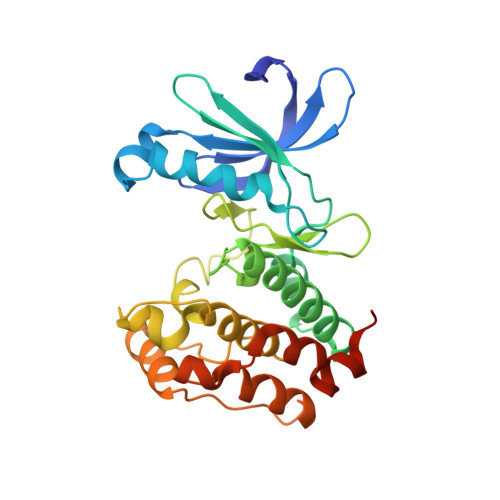A Novel Mechanism by Which Small Molecule Inhibitors Induce the DFG Flip in Aurora A.
Martin, M.P., Zhu, J.Y., Lawrence, H.R., Pireddu, R., Luo, Y., Alam, R., Ozcan, S., Sebti, S.M., Lawrence, N.J., Schonbrunn, E.(2012) ACS Chem Biol 7: 698-706
- PubMed: 22248356
- DOI: https://doi.org/10.1021/cb200508b
- Primary Citation of Related Structures:
3UNJ, 3UNK, 3UNZ, 3UO4, 3UO5, 3UO6, 3UOD, 3UOH, 3UOJ, 3UOK, 3UOL, 3UP2 - PubMed Abstract:
Most protein kinases share a DFG (Asp-Phe-Gly) motif in the ATP site that can assume two distinct conformations, the active DFG-in and the inactive DFG-out states. Small molecule inhibitors able to induce the DFG-out state have received considerable attention in kinase drug discovery. Using a typical DFG-in inhibitor scaffold of Aurora A, a kinase involved in the regulation of cell division, we found that halogen and nitrile substituents directed at the N-terminally flanking residue Ala273 induced global conformational changes in the enzyme, leading to DFG-out inhibitors that are among the most potent Aurora A inhibitors reported to date. The data suggest an unprecedented mechanism of action, in which induced-dipole forces along the Ala273 side chain alter the charge distribution of the DFG backbone, allowing the DFG to unwind. As the ADFG sequence and three-dimensional structure is highly conserved, DFG-out inhibitors of other kinases may be designed by specifically targeting the flanking alanine residue with electric dipoles.
Organizational Affiliation:
Drug Discovery Department, Moffitt Cancer Center and Research Institute, Tampa, Florida 33612, United States.
















